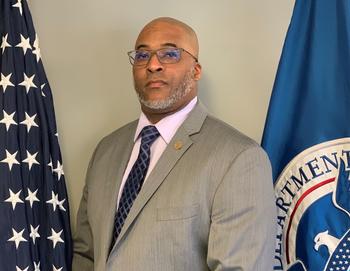
Shawn Lenore has literally dodged a bullet. Many of them. The retired Army senior noncommissioned officer with more than 20 years of service—a good part of it serving in Iraq—eventually found calmer work after his active-duty career. The culmination being his final assignment on presidential support duty at the White House Military Office and now working within the U.S. Department of Homeland Security.
Action seems to find him anyway: As director of the Federal Emergency Management Agency’s (FEMA) National Exercise Division (NED), Lenore leads the National Exercise Program (NEP), a two-year cycle of exercises across the nation that assesses, examines, and validates the nation’s core capabilities to prevent, protect against, respond to, recover from, and mitigate hazards such as hurricanes, wildland fires, pandemics, complex coordinated terrorist attacks, cyberattacks and other disasters, through superior preparedness exercises.
Busy enough? Not for him: He’s also a student at George Mason University’s Schar School of Policy and Government as a member of the Master of Public Administration (MPA) program, attending classes at night.
NED, he explained, administers the NEP on behalf of the federal government and helps assists the nation in enhancing its preparedness and resilience for threats and hazards by designing and delivering exercises at federal, state, local, tribal, and territorial levels of government and throughout the whole community, focused on testing and validating all hazards policies, plans, and procedures.
Exercises are a key component of national preparedness as they provide the whole community with the opportunity to shape planning, assess, and validate core capabilities and address areas for improvement and, when properly leveraged, can mitigate and reduce the loss of life and property.
It’s a big job and, Lenore said, a continuation of his devotion to public service and serving others. His MPA degree, he added, will enhance his public policy and organizational leadership skills, and support his continual professional development goals.
“I will become a lot more informed from an academic and theory perspective,” he said. “I believe you should never be satisfied. I think there are a lot of benefits to on-the-job training experience, but I don’t think that should substitute for continuing to do formal education.”
His Schar School experience is already paying off.
“Last semester, I took a government contracting class as a challenge to myself and that one was very beneficial in understanding not just the theory but the real-world application on government contracting,” he said.
Lenore has a clear thirst for knowledge and need to constantly challenge himself, be it in the field or in academia. The Schar School is providing him with the right platform to maximize his professional pursuits.
